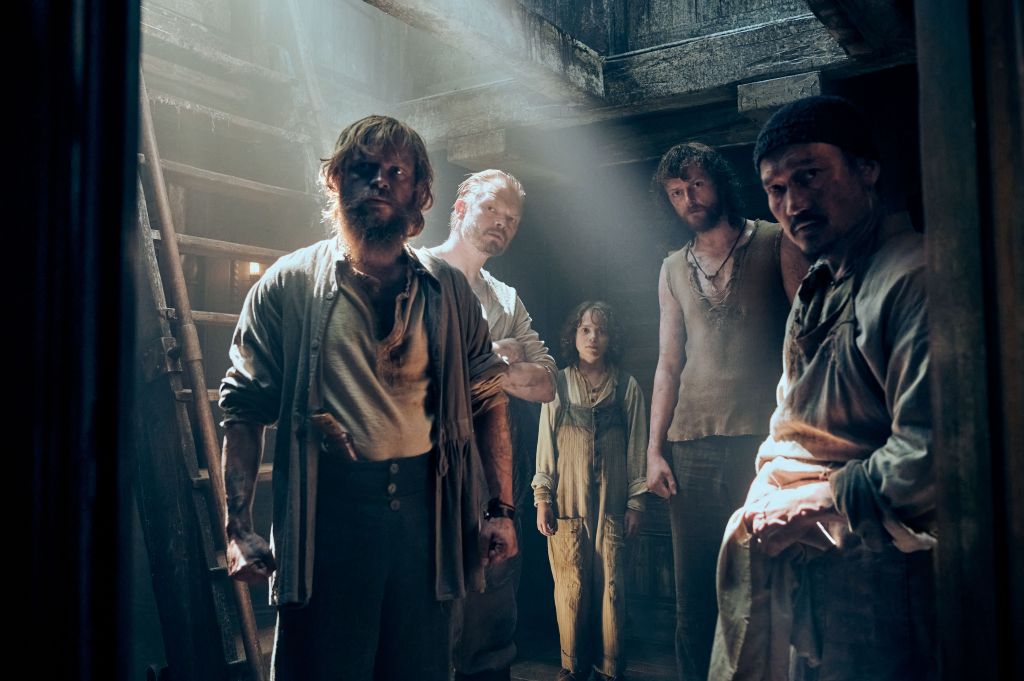To call The Last Voyage of the Demeter predictable is like calling Count Dracula a carnivore – absolutely self-evident, yet still underselling things just a bit. Even on the slim off chance that audience members have never seen a movie based on Bram Stoker’s Dracula before, the movie at hand spoils itself right off the bat, both in onscreen text and an opening scene that shows the final outcome – a boat named the Demeter crashes on the shores of Whitby, England, with no survivors alive onboard.
Vlad Takes Whitby
The rest of the movie flashes back to that ship’s journey from the beginning, its endpoint as assured as that of a summer camp beside Crystal Lake. In fact, The Last Voyage of the Demeter resembles few movies as much as Friday the 13th Part VIII: Jason Takes Manhattan, which mostly featured Jason Voorhees killing people on a boat headed for New York. It’s basically a cheap slasher with an expensive and classy veneer.

The production design by Edward Thomas (the Escape Room movies), the score by Bear McCreary, and the casting by Nina Gold, Anna-Lena Slater, and Martin Ware are all impeccable – this is a great looking and sounding movie, filled with more familiar character actors than you may have expected. Unfortunately, it’s also dull, predictable, and stupid. There’s almost nowhere for the story to go, but to be fair, we could say the same for a lot of slashers. These days, though, fans expect the characters in such films to be at least a little bit smart.
The fact that nobody in the movie knows what a vampire is only goes so far. Once you see them spontaneously combust in direct sunlight, why wait until nighttime to fight the main boss? At one point, characters actually find Dracula’s coffin and proceed to do absolutely nothing with that information. Regardless of what they do or don’t know about his powers, it’s not like tossing it overboard would have made him madder.
Bloodiness Is Life
Considering the Dracula (Javier Botet) in this movie, who mostly resembles a naked Count Orlock from Nosferatu, has almost unlimited, arbitrary powers, maybe it doesn’t matter much. He can sustain flesh wounds from blades and bullets, yet can turn into mist when he needs to hide. He can fly. And he evinces no weakness to crosses, which feels like a general antipathy towards religion overall – the most pious character turns out to be hypocritically selfish and judgmental in a most un-Christ-like way.

The primary audience for The Last Voyage of the Demeter, then, will be gorehounds who just want to see some creative kills and monster effects. On that level, it delivers, with no character safe, and some deaths deliberately taboo-breaking. We already know the characters are basically doomed – what remains is merely to watch them walking toward inevitable demises onboard a stylish wooden ship. Adolescent boys who crack up at hearing the word “seaman” may find extra levels of enjoyment.
Perhaps unfortunately for Universal, they already put out a Dracula movie this year, with better kills, more gore, and an actual story. Renfield, as of this writing, is available to watch on Peacock and to buy on Blu-ray – all The Last Voyage of the Demeter has over it is a boat. If you really, really like boats, fair enough.
Peevish and Boat-Heads
Despite thin material, Game of Thrones‘ Liam Cunningham proves once again Seaworth-y as the doomed captain, with a voice made for enunciation and eyes jut as made to convey the growing realization of doom. David Dastmalchian makes a worthy, skeptical first mate, with Deadpool‘s Colossus, Stefan Kapicic, as the obligatory big guy. Corey Hawkins serves as an audience surrogate, playing the smarter-than-average guy joining this macho crew at the last minute, while Javier Botet again delivers his expert creepy contortions as Doug Jones’ heir apparent in the skinny latex monster roles. They make the characters believable, yet without an interesting script they can only do so much. This doesn’t seem like the sort of movie where you’re meant to laugh at people making really poor decisions, yet it frequently verges on such risibility.

In the brief scenes that take place before and after the Demeter’s journey, the movie offers glimpses of what could have been an impressive-looking Dracula adaptation, one that the events onscreen ought to take no more than ten minutes of. Naturally, The Last Voyage of the Demeter could be followed by sequels that similarly expand upon small parts of the book – both literally and figuratively, however, they’d be missing the boat.
Grade: 1/5




